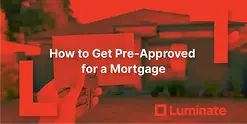Working with Real Estate Agents: Guide for NZ First-Home Buyers
 By
Trent Bradley
·
13 minute read
By
Trent Bradley
·
13 minute read

If you're buying your first home in New Zealand, you're going to encounter real estate agents early in the process. They'll show you through open homes, talk to you about offers, and guide you through parts of the buying process. But one important thing many first-home buyers don't realize is that while agents may seem helpful, they're not actually working for you.
Table of Contents
- Understanding the Real Estate Agent's Role in New Zealand
- Building Your Own Team: Who Actually Works for You
- What to Share (and What Not to Share) With Real Estate Agents
- How to Ask Questions That Protect Your Interests
- Navigating Different Sales Methods in New Zealand
- Recognizing and Handling Sales Tactics
- Working Effectively With Agents: Best Practices
- Red Flags: When to Be Extra Cautious
- After You Make an Offer: Managing the Process
- How Luminate Financial Group Supports First-Home Buyers
- Frequently Asked Questions About Working with Real Estate Agents in NZ
- Take Control of Your First-Home Buying Journey
Key Takeaways
- Real estate agents in New Zealand work for the seller, not you—they're paid by the seller and legally obligated to act in the seller's best interests, so build your own team of advisers
- Get mortgage pre-approval before engaging with agents so you're taken seriously as a buyer and know exactly what you can afford without revealing your maximum budget
- Share strategically with agents—disclose that you're pre-approved and actively looking, but keep private your budget ceiling, emotional attachment to properties, and any urgency
- Ask direct, specific questions about property history, time on market, building consents, and known defects—agents must answer truthfully when asked but won't volunteer everything
- Recognize common sales tactics including creating urgency ("won't last long"), implying competition ("multiple offers"), and minimizing issues ("just cosmetic")—stay grounded in your research
- For auctions, complete ALL due diligence beforehand (building reports, LIM review, full finance approval) as auction bids are unconditional—never bid unless 100% certain you can complete
- Work closely with your mortgage adviser to review properties for bank acceptability before making offers and lean on your lawyer for all formal negotiations
- Understand different sale methods—private treaty allows conditional offers and time for inspections, deadline sales require offers by a set date, auctions demand unconditional bids
At Luminate Financial Group, we work with first-home buyers every day. One of the most common questions we hear is: "How do I deal with real estate agents?" In this comprehensive guide, we explain what to expect, how to protect yourself, and how to get the most out of working with agents while keeping your interests front and center.
Understanding the Real Estate Agent's Role in New Zealand
Before you can work effectively with real estate agents, you need to understand exactly who they represent and what their obligations are under New Zealand law.
Who Does the Real Estate Agent Actually Represent?
In New Zealand, a real estate agent's legal obligation is to act in the best interests of the seller. That's who hires them, who pays their commission, and who they are accountable to. Their role is to sell the property for the best price and on terms that suit the vendor.
Key facts about agent representation:
- Agents are contracted and paid by the seller
- Their commission is typically 2-4% of the sale price (paid by the seller)
- They have a fiduciary duty to the vendor, not the buyer
- They must follow the Real Estate Agents Act 2008 and Code of Conduct
This doesn't mean they are working against you, but it does mean you should be strategic about what you share. The agent is not your adviser. Their job is to get the property sold, not to help you negotiate a bargain or highlight risks in the paperwork.
What Real Estate Agents Are Required to Do
Under New Zealand law, real estate agents must:
- Act honestly and in good faith
- Not mislead or deceive buyers
- Disclose material facts about the property they're aware of
- Provide accurate information when asked direct questions
- Follow the Code of Professional Conduct and Client Care
Important distinction: Agents must answer truthfully when asked specific questions, but they're not required to volunteer information that might harm the seller's position. This is why asking the right questions is crucial.
Understanding Agent Motivation and Commission Structure
Real estate agents typically earn commission based on the final sale price:
| Sale Price | Typical Commission (2.5%) | Agent Earnings |
|---|---|---|
| $600,000 | $15,000 | $15,000 |
| $700,000 | $17,500 | $17,500 |
| $800,000 | $20,000 | $20,000 |
The higher the sale price, the more the agent earns. This creates a natural incentive to maximize the price and encourage buyers to offer more. Understanding this helps you recognize sales tactics and maintain objectivity during negotiations.
Building Your Own Team: Who Actually Works for You
Since the real estate agent represents the seller, first-home buyers need their own team of professionals who have their interests at heart.
Your Essential First-Home Buyer Team
| Team Member | Role | Who They Work For |
|---|---|---|
| Mortgage Adviser | Secures finance, reviews properties for bank acceptability, guides funding strategy | You (the buyer) |
| Property Lawyer/Conveyancer | Reviews contracts, handles legal due diligence, manages settlement | You (the buyer) |
| Building Inspector | Conducts pre-purchase building reports, identifies defects | You (the buyer) |
| Real Estate Agent | Markets property, facilitates sale, negotiates on behalf of seller | Seller (not you) |
At Luminate, we act as your advocate and guide throughout the entire process. We help you understand what the bank will accept, review key documents, liaise with agents and lawyers, and keep you on track from pre-approval to settlement.
Why You Don't Need a Buyer's Agent in New Zealand
Buyer's agents (professionals who represent buyers exclusively) are not widely used in New Zealand compared to countries like Australia or the United States. This is because:
- The market structure is different
- Costs can be significant ($3,000-$10,000+)
- Most buyers achieve good outcomes using a mortgage adviser, solicitor, and their own research
For first-home buyers, working with an experienced mortgage adviser like Luminate provides most of the same benefits at no direct cost to you.
What to Share (and What Not to Share) With Real Estate Agents
One of the biggest mistakes first-home buyers make is sharing too much information with agents. Here's how to navigate conversations strategically.
Information You Can Share
Safe to disclose:
- That you're pre-approved for finance
- You're actively looking in the area
- Your general timeline (e.g., "We're hoping to buy in the next few months")
- That you're a first-home buyer (this can sometimes work in your favor)
- You're working with a mortgage adviser and solicitor
Information to Keep Private
Avoid disclosing:
- Your maximum borrowing capacity or budget ceiling
- How emotionally attached you are to a specific property
- That this is the only property you're seriously considering
- Your exact deposit amount or financial details
- Any urgency or pressure you're under to buy quickly
- That you'll "pay whatever it takes"
Strategic Responses to Common Agent Questions
When asked: "What's your budget?" Better response: "We're pre-approved and looking in this general price range, but we're still comparing properties and doing our due diligence."
When asked: "How much can you borrow?" Better response: "We're comfortable with properties in this area and price bracket."
When asked: "Are you interested in making an offer?" Better response: "We're interested, but we need to review the documentation and complete our checks first. Can you send us the title, LIM, and any building reports?"
When asked: "This won't last long—can you decide today?" Better response: "We understand there's interest, but we need to complete our due diligence. We'll be in touch once we've reviewed everything."
The key is to remain polite, professional, and non-committal while gathering the information you need to make an informed decision.
How to Ask Questions That Protect Your Interests
Since agents won't volunteer everything, you need to ask specific, direct questions. Here's your comprehensive question framework.
Essential Property Questions to Ask Every Agent
Property history and marketing:
- How long has this property been on the market?
- Has the asking price been reduced? If so, by how much and when?
- How many open homes have there been?
- Have there been any previous offers that didn't proceed? Why?
- What is the seller's timeline? Are they motivated to sell quickly?
Property condition and documentation:
- Are there any reports available (LIM, building report, electrical certificate, meth test)?
- Has there been any building work done? Was it consented?
- Do you have copies of the building consents and Code Compliance Certificates?
- Are there any known defects or issues with the property?
- When was the roof last replaced or repaired?
- Has there been any water damage, leaks, or moisture issues?
- What type of insulation is installed?
Title and legal matters:
- What is the title type (freehold, leasehold, unit title)?
- Are there any easements, covenants, or restrictions on the title?
- Are there any boundary disputes or issues with neighbors?
- For unit titles: What are the body corporate fees? Are there any upcoming special levies?
Sale process questions:
- What is the sale method (negotiation, deadline, auction)?
- If deadline or auction: What is the date?
- Are there any other interested parties or offers?
- Will the sale be conditional or unconditional?
- What is the preferred settlement timeframe?
How to Interpret Agent Responses
Agents are skilled communicators. Pay attention to:
- Vague answers: If an agent avoids giving specific details, this may indicate a problem
- Overly positive spin: Excessive enthusiasm about "character" or "potential" may mask issues
- Deflection: Changing the subject when asked difficult questions
- Pressure tactics: Creating urgency or scarcity to prompt quick decisions
Red flag phrases:
- "I can't disclose that information" (for things that should be transparent)
- "You'll need to ask the vendor" (on basic property questions the agent should know)
- "It's being sold as-is" (may indicate known defects)
- "There's a lot of interest" (may be true, but often used to create urgency)
Always follow up important conversations in writing via email so you have a record of what was discussed.
Navigating Different Sales Methods in New Zealand
Understanding how different sale methods work helps you prepare appropriately and avoid costly mistakes.
Private Treaty (Negotiation)
How it works: Most common sale method in New Zealand. You make a written offer that can include conditions such as finance approval, building inspection, or LIM review.
Timeline: Typically 2-6 weeks from offer to settlement
Advantages for buyers:
- Can include protective conditions
- Time to complete due diligence
- Can negotiate on price and terms
- Can withdraw if conditions aren't satisfied
What to do:
- View the property and complete initial research
- Make a conditional offer through your lawyer
- Complete building inspections and review LIM
- Negotiate based on findings
- Satisfy or waive conditions
- Proceed to settlement
Deadline Sale
How it works: All offers must be submitted by a specific date and time. Offers may be conditional or unconditional. The seller reviews all offers and accepts the most favorable one.
Timeline: Usually 2-4 weeks from first viewing to deadline
Advantages for buyers:
- Can still include conditions (unlike auctions)
- Know the timeframe clearly
- Less pressure than auction environment
What to do:
- View property early in the campaign
- Arrange pre-purchase building inspection immediately
- Review LIM and other documentation
- Get final lending approval before deadline
- Submit your best offer before deadline
Auction
How it works: Public bidding process where the highest bidder wins. All bids are unconditional—if you win, you must settle.
Timeline: Typically 3-4 weeks from first viewing to auction
Advantages for sellers (not buyers):
- Competitive environment drives up price
- Unconditional sale on auction day
- Price discovery through bidding
What to do:
- View property early (3-4 weeks before auction)
- Complete all due diligence immediately:
- Pre-purchase building inspection
- LIM review
- Title search
- Get full finance approval (not just pre-approval)
- Arrange deposit funds
- Have lawyer review contract before auction
- Set your maximum bid and stick to it
- Register to bid before auction starts
Important: At auction, you're bidding unconditionally. If you win, you must settle. Never bid unless you're 100% certain you can complete the purchase.
Recognizing and Handling Sales Tactics
Real estate agents are trained negotiators. Being aware of common tactics helps you stay objective and in control.
Common Sales Tactics and How to Respond
Tactic 1: Creating Urgency What you'll hear: "This won't last long," "We've had multiple inquiries," "Someone viewed it twice yesterday"
How to respond: Stay calm. If the property is right for you and fits your criteria, take the time you need to complete proper due diligence. Good properties may move quickly, but rushing leads to expensive mistakes.
Tactic 2: Price Anchoring What you'll hear: "The owners were hoping for $X," "Properties in this street have sold for $X+"
How to respond: Do your own research on recent comparable sales. Your offer should be based on market data, property condition, and your budget—not the seller's expectations.
Tactic 3: Implied Competition What you'll hear: "There's already strong interest," "Another buyer is coming back for a second look," "We're expecting offers this week"
How to respond: This may be true, but it shouldn't change your approach. Make your best offer based on what the property is worth to you, not fear of missing out.
Tactic 4: Minimizing Issues What you'll hear: "That's just cosmetic," "It's an easy fix," "All older homes have that"
How to respond: Get professional opinions. What seems minor to an agent could be a major structural or compliance issue. Always obtain a building report.
Tactic 5: The Friendly Approach What you'll experience: Agent becomes very friendly, remembers personal details, makes you feel like they're on your side
How to respond: Be polite and professional, but remember their obligation is to the seller. Don't let personal rapport cloud your judgment or lead you to share too much information.
Staying Grounded During Negotiations
Your negotiation checklist:
- ✓ Stay within your pre-approved budget
- ✓ Base decisions on property research and building reports
- ✓ Take time to think—never make rushed decisions
- ✓ Consult your mortgage adviser before making or increasing offers
- ✓ Get all promises or claims in writing
- ✓ Don't get emotionally attached to properties
- ✓ Be prepared to walk away if the deal doesn't make sense
Working Effectively With Agents: Best Practices
While maintaining appropriate boundaries, you can still build productive working relationships with real estate agents.
How to Be a Serious Buyer Without Oversharing
Professional buyer behaviors:
- Arrive on time for viewings
- Be respectful and courteous
- Ask informed, specific questions
- Follow up promptly on documentation requests
- Submit offers through your solicitor in writing
- Maintain clear communication throughout negotiations
What agents respect:
- Buyers who are genuinely pre-approved
- Organized buyers who complete due diligence efficiently
- Buyers who make clear, well-structured offers
- Buyers who communicate honestly about timelines
Building Rapport Without Compromising Your Position
You can be friendly and professional without revealing your full hand:
- Thank agents for their time and information
- Provide general updates ("We're still comparing a few properties")
- Be respectful of their schedules and processes
- Acknowledge their expertise while maintaining your independence
When to Involve Your Mortgage Adviser
Contact your mortgage adviser:
- Before viewing properties (to confirm budget and get pre-approval)
- When you find a property you're interested in (to confirm bank acceptability)
- Before making any offer (to verify you can obtain finance)
- When the agent provides new information that may affect lending
- If the agent suggests alternative financing or terms
At Luminate, we review properties before you make offers and communicate directly with agents when appropriate to ensure smooth transactions.
Red Flags: When to Be Extra Cautious
Certain agent behaviors or property situations warrant extra vigilance and professional advice.
Agent Red Flags
Be cautious if an agent:
- Refuses to answer direct questions about property condition
- Pressures you to make unconditional offers when you're uncomfortable
- Discourages building inspections or LIM reports
- Provides inconsistent information across conversations
- Makes promises not reflected in the sale agreement
- Suggests you don't need a lawyer or adviser
- Pushes you to exceed your stated budget
Property Red Flags That Agents May Downplay
Watch for:
- Multiple price reductions suggesting overpricing or hidden issues
- Property returning to market after previous failed sales
- Vague or evasive answers about renovation history
- "Sold as-is" clauses that may hide defects
- Lack of available documentation (LIM, building reports, consents)
- Recent cosmetic renovation covering potential problems
- Properties in leaky building risk categories (1992-2004 construction)
If you encounter any of these red flags, proceed with extreme caution and get professional advice before committing.
After You Make an Offer: Managing the Process
Once you've submitted an offer, the agent's role shifts to facilitating negotiations between you and the seller.
What Happens After You Submit an Offer
Typical process:
- Your lawyer submits your written offer to the agent
- Agent presents your offer to the seller
- Seller accepts, rejects, or counters your offer
- Negotiations continue until agreement or impasse
- Once accepted, you proceed with conditions (if any)
- Sale becomes unconditional when conditions are satisfied
- Settlement occurs on agreed date
Communicating During Negotiations
Best practices:
- All formal offers and counteroffers should go through your lawyer
- You can communicate directly with agents for updates and questions
- Don't negotiate directly with the seller (this should go through agents and lawyers)
- Keep records of all conversations and agreements
- If the agent reports "the seller says X," ask for written confirmation
Staying Strong During Counteroffers
Agents may relay messages designed to prompt you to increase your offer:
- "The seller is disappointed with that price"
- "You're close, but the vendor wants more"
- "There's another offer at a higher price"
Remember:
- You're not obligated to increase your offer
- Your offer should reflect the property's value and your budget
- Don't let emotional manipulation drive your decisions
- If another offer is genuinely higher and unconditional, the seller will take it
How Luminate Financial Group Supports First-Home Buyers
At Luminate, we understand the challenges first-home buyers face when dealing with real estate agents and navigating the property market.
Our First-Home Buyer Services
Pre-Approval and Budget Clarity We help you understand exactly what you can afford and secure pre-approval, so you're taken seriously by agents and sellers.
Property Review and Bank Acceptability Before you make an offer, we review the property to confirm it meets lending criteria. This prevents wasted time on properties banks won't finance.
Agent Communication Support We can liaise with agents on your behalf when discussing lending requirements, settlements, and conditions.
Documentation Review We help you understand LIM reports, building reports, and other documentation to make informed decisions.
Negotiation Strategy We provide guidance on structuring offers, including appropriate conditions and realistic pricing based on bank valuations.
Full-Process Support From your first property viewing through to getting the keys, we coordinate with your lawyer, the agent, and the lender to ensure smooth settlements.
Frequently Asked Questions About Working with Real Estate Agents in NZ
Do I have to use the agent to make an offer?
No. While agents facilitate the sale, your lawyer submits your formal offer to the agent. You never have to deal directly with the agent for legal matters, though they often assist with logistics and communication.
Can I negotiate directly with the seller?
Technically yes, but it's not recommended. The agent is the seller's representative, and all negotiations should flow through proper channels (your lawyer to the agent to the seller's lawyer). Direct negotiation can create legal complications and misunderstandings.
What if the agent tells me there's another offer?
They may be telling the truth, or they may be using this as a negotiation tactic. Don't panic or immediately increase your offer. Stick to your budget and strategy. If the other offer is better, the seller will take it—that's their right.
Should I attend all open homes or just the ones I'm seriously interested in?
Attend several open homes to understand the market, but focus your detailed inspections on properties that genuinely meet your criteria. This helps you build market knowledge without wasting time.
Can I ask to see the agent's listing agreement with the seller?
Generally no—this is a private agreement between the agent and seller. However, agents must disclose their commission structure if you ask.
What if I find a property issue that the agent didn't mention?
If it's a material fact that affects the property's value or safety, the agent should have disclosed it when asked. Document the issue, inform your lawyer, and obtain professional reports. You may be able to renegotiate or withdraw based on your offer conditions.
How do I know if an agent is trustworthy?
Check their licensing on the Real Estate Authority website. Read reviews and ask for references. Trust your instincts—if something feels off, proceed cautiously and lean heavily on your own professional advisers.
Can real estate agents recommend mortgage advisers or lawyers?
Yes, they can provide recommendations, but remember these referrals may be based on relationships that benefit the agent. Always choose your own professionals based on your research and needs.
What happens if the agent makes a mistake in the listing or advertising?
Agents are responsible for accurate advertising under the Fair Trading Act. If there are material misrepresentations, this could affect the sale. Document everything and consult your lawyer immediately.
Should I get pre-approval before talking to agents?
Absolutely. Pre-approval shows you're a serious buyer and gives you confidence in your budget. Agents take pre-approved buyers more seriously and you'll be ready to move quickly on the right property.
Can I make an offer without viewing the property?
Technically yes, but it's not recommended. Always view properties in person and complete due diligence before making formal offers, especially for your first home.
What if I change my mind after making an offer?
If your offer included conditions (finance, building inspection, LIM review), you can often withdraw during the conditional period if those conditions aren't satisfied. If your offer was unconditional, you're legally bound and withdrawing could have serious financial consequences. Always get legal advice.
Take Control of Your First-Home Buying Journey
Real estate agents play an important role in most property sales, but they are working for the seller, not you. As a first-home buyer, you need to be strategic, informed, and supported by your own team of professionals.
Stay calm, ask the right questions, protect your financial interests, and work with advisers who have your best interests at heart. Buying your first home should be exciting and empowering—not stressful or overwhelming.
Ready to Work Confidently With Real Estate Agents?
Book your free First-Home Planning Session with Luminate today.
We'll help you:
- Get pre-approved so you're taken seriously by agents and sellers
- Understand what to ask and what to keep private
- Review properties for bank acceptability before you make offers
- Navigate negotiations and protect your interests
- Support you from first viewing to getting the keys
Contact Luminate Financial Group:
📞 Call 0800 333 400📧 Email askus@luminate.co.nz
🌐 Visit luminate.co.nz
Disclaimer: This article provides general information only and should not be considered legal or financial advice. Real estate transactions involve legal obligations and risks. Always work with qualified professionals including a mortgage adviser and property lawyer. Real estate agent obligations are governed by the Real Estate Agents Act 2008 and Code of Professional Conduct.

Trent Bradley
Trent Bradley is a New Zealand financial advisor specializing in property-backed finance and investment consulting. With over 26 years of experience running his mortgage broking business, he has helped wholesale investors access high-yield property-backed loan opportunities. For the past 12 years, Trent has led Luminate Finance, a New Zealand finance company dedicated to connecting investors with secure property investment solutions.


























